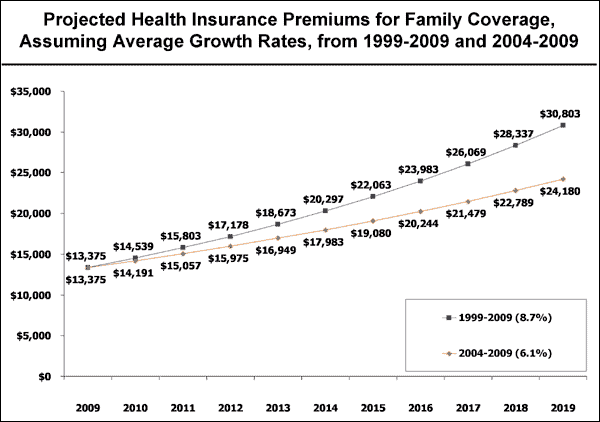Pulling it Together: Simple Arithmetic
This week we put out our annual benchmark survey of employer health coverage and costs. Two numbers jumped off the pages.
The first number was the average cost of a family health insurance policy in 2009: $13,375. To put that number in context, if you are an employer, you can hire an employee at the minimum wage for about $15,000 per year. If you are a consumer, you can rent an average two-bedroom apartment nationwide for $11,136 per year (though it is quite a bit more here in Menlo Park, California where our Foundation is based). You can also buy a new Chevy Aveo for $12,000, and it gets 35 miles per gallon on the highway.
The other result that jumped off the page was the stark contrast between increases in health insurance premiums and overall inflation in the general economy. Premiums went up 5% and prices overall fell 0.7% (mainly driven by a big drop-off in energy prices).
The 5% increase we found in premiums is moderate by long-term historical standards. For example, two different times during the last decade premiums increased by 13% a year, in 2002 and 2003. This year’s increase continues a multi-year period of relative moderation in premium increases. Still, over the last ten years premiums have increased by 131%, while wages have grown 38% and inflation has grown 28%. Consider this: If people (and businesses) are as concerned as they are now about rising health care costs in a period when they are actually moderating, how much more concerned will they be when rates of increase return to historic averages?
Let’s do some very simple arithmetic. Start with a fairly conservative assumption: If we assume that premium increases over the next ten years will average what they did over the last five (about 6.1% per year), the average premium for a family policy in 2019 will be $24,180. That’s a big number. On the other hand, if we assume increases revert to the average of the last ten years—an average annual increase of about 8.7% and a very plausible scenario—premiums in 2019 will average a whopping $30,803, a very scary number (Figure 1).
Figure 1

Note: Health insurance premiums projected for 2010-2019 assuming (1) that the average growth in premiums between 1999 and 2009 (8.7%) continues or (2) that the average growth in premiums between 2004 and 2009 (6.1%) continues. Source: Kaiser Family Foundations projections based on data from Kaiser/HRET Survey of Employer-Sponsored Health Benefits, 1999-2009.
One obvious implication is that we need to get more serious about reaching agreement on ways to slow the rate of increase in health care costs. But consensus on measures that would put a real dent in the health cost trajectory has been hard to achieve. Even simple first steps, such as comparative effectiveness research to collect data on what works and what does not in medical practice, have proven controversial, requiring language in draft legislation disavowing that they will ever be linked to payment. And when the public can be so readily scared that these efforts will lead to rationing, it’s a signal that the obstacles to reining in health costs are more fundamental than interest group opposition and health reform politics. Our polls show that we are far from the level of public understanding needed to meaningfully take on health care costs.
Even under the most optimistic scenarios, reducing the rate of increase in health costs will take time. This is why decisions about who gets subsidies and how generous subsidies will be in the health reform legislation now being drafted on Capitol Hill are so important. These decisions will determine how many people get help with their health care costs as insurance premiums and cost sharing become ever more unaffordable for average Americans. Projecting a family premium of more than $30,000 in ten years is simple arithmetic, but the implications for people and employers are real. Low and moderate income people are going to need some help paying for health care and health insurance as we learn which delivery and payment reforms work best and cost containment efforts ramp up.
